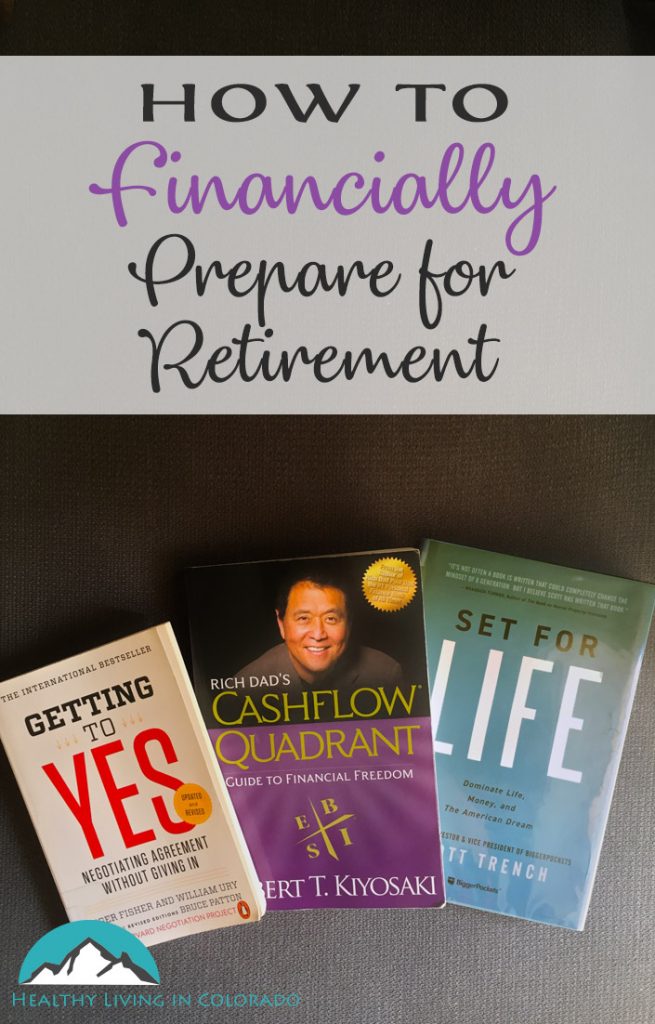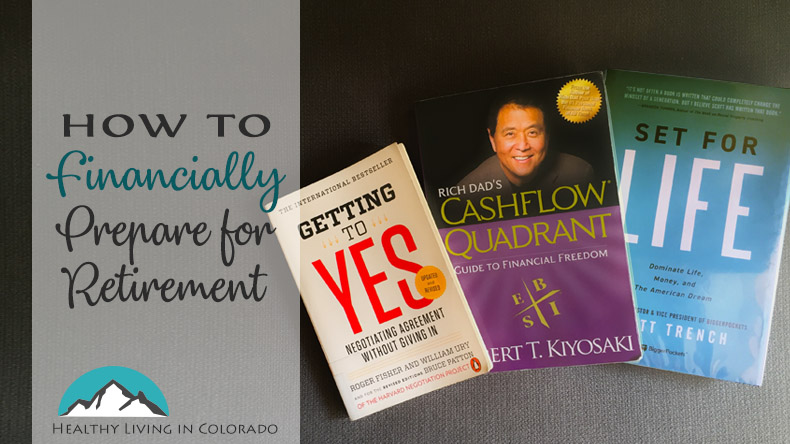Will your 401(k) still be there when you need it? What is cashflow and why is it important? Will we have enough money to retire? I’m tired of my job and want to do my own thing to make a living…
Do any of the above statement sounds like you or your partner? My husband and I have been diving deeply into the investment and entrepreneurship world like crazy the past few months.
Click below to save on Pinterest to read later.

Financial Health
Financial health is a very real thing, but doesn’t get as much attention as diet, exercise, health care, etc. But finances are one of the main stressors of life. And stress causes so many health concerns as we know.
Plus health can look like so many things including physical, spiritual, mental, emotional, and yes – even financial.
So today I wanted to let you into some of our personal journey regarding finance, small business, and investments. And hopefully you can learn a few things to kickstart your thinking and decision making as well.
In the spring of 2019, we stumbled upon a docuseries called “Money Revealed.” We watched most of the 9 episodes with our mouths hanging open and our minds reeling.
Our eyes were opened to a whole new way of thinking about finances that we had not really been exposed to much before.
In “Money Revealed” we heard from financial whizzes like Robert Kiyosaki, Garrett Gunderson, real estate investors, stock traders, cryptocurrency experts, Amazon sellers, a doTERRA rep talking about MLM’s, and so many more.
Before I go on, let me say that I am not at all a financial planner or expert in financial things. But as I learn I like to share with others. Please talk with your financial team before making any decisions. This is just what I have personally taken away from my studies.
Financial Changes
After these 9 sessions and 18 interviews, here are some of our main takeaways.
- We want to pull out our 401(k). After understanding the history of 401(k)s and it’s probable future with Baby Boomers cashing in soon, how it’s taxed, and many other things, we realize there may be nothing left for us when it’s time for us to retire.
- We want to learn investing well so that we can be in charge of our financial destiny, not pawn it off on someone else.
- We only have enough money for one year of retirement as of today, assuming my husband retires at age 65. Because of this we realize,
- We must find ways to create cashflow! This would take care of us in retirement way longer than just one year.
- Some of the main ways to create cashflow are through real estate, starting a business that can ultimately run without you, and investing in stocks and commodities. These can also come with great tax benefits.
Do you have enough money to retire on? If not, join most Americans!
But instead of just being flippant about it and putting it off until we are retired, my husband and I have been feverishly reading good financial books.
Financial Books
I know there are books out there that basically say give all you can to your retirement account, and save, save, save!
This book list is NOT that. I am not against this idea if that’s what you choose, but we are choosing a different path that makes more sense to us now that we are beginning to educate ourselves.
This is not every book we have read, but the best ones that keep coming up in conversations, on podcasts, and that we have actually read. We have read other great books recently, but these are our favorites.
So please do yourself a favor and read one or all of these depending on your interest! They are broken down into three categories: Investment Books, Business Books, and Personal Finance Books.
1. Investment Books
Cashflow Quadrant: Rich Dad’s Guide to Financial Freedom (Robert Kiyosaki) is like Rich Dad Poor Dad: Part 2 according to the beginning of this book. I really enjoyed the original, but the reason I listed Cashflow Quadrant as my preference is because Kiyosaki does a good job of explaining how to get from the left side of the quadrant (Employee and Self-employeed) to the right side (Big business owner and Investor). Investor is a great quadrant to be in, so I like learning how to do that and the mind sets involved to help you as well.
Killing Sacred Cows: Overcoming the Financial Myths That Are Destroying Your Prosperity (Garrett Gunderson) is really enlightening in terms of the 401(k) and pension issue. I would read anything this guy puts out. He really knows his stuff!
What Would the Rockefellers Do?: How the Wealthy Get and Stay That Way (Garrett Gunderson) looks at how the Rockefellers set up a system to maintain their money for future generations. By understanding what they have done, this book shows you how you can do it, too. Use your money without losing it.
How to Invest in Real Estate: The Ultimate Beginner’s Guide to Getting Started (Joshua Dorkin and Brandon Turner) is my favorite real estate investing book so far. This book is great for newbies like myself. They break it down into really easy to understand lingo and help you think through how to start in real estate investing.
2. Business Books
Choose: The Single Most Important Decision Before Starting Your Business (Ryan Levesque) is a helpful business book if you are considering starting your own business. There are helpful worksheets to help you think through the process of knowing which type of business you should start or what type of ebook you should write. There is a green, yellow and red light concept to help guide your process into the right market.
Start Your Own Corporation: Why the Rich Own Their Own Companies and Everyone Else Works for Them (Garrett Sutton). The title says it all! It’s written by a Rich Dad lawyer, and he goes over really specific things you will need to do legally to open and run a business. He discusses choosing the entity, getting a proper team together of CPA, attorney, bookkeeper, etc. This book was actually really overwhelming and let me see all that goes into a proper business… and all that could go wrong and how to protect yourself.
Never Lose a Customer Again: Turn Any Sale into Lifelong Loyalty in 100 Days (Joey Coleman) helps you think through your customer’s experience with you and how to anticipate their needs before they even notice them. As you make them feel noticed and appreciated, you increase their loyalty and your profits as well.
The ONE Thing: The Surprisingly Simple Truth Behind Extraordinary Results (Gary W. Keller and Jay Papasan) is good to help you think through your priorities and how to weed things out of your life that drain you or suck your time. A lot of entrepreneurs bounce from one thing to another until they find something that “lands,” but then you never really become an expert at anything. This books guides you through questions to narrow your focus on your one thing and how to prioritize that.
How to Win Friends and Influence People (Dale Carnegie) is a book I avoided for a long while because the title sounded like it was encouraging manipulation. That is the farthest thing from the truth about this book. It encourages you to pay attention to people, take care of their needs, and honestly be good friends to others. Simple, empowering, and needed.
Getting to Yes: Negotiating Agreement Without Giving In (Roger Fisher and William Ury) gives you confidence in one of the most neglected part of business: negotiation. This book shows how to look beyond positions to find common interests that can help lead to satisfactory agreements from both sides. Don’t give up, but work together with others to find creative and fair options.
3. Personal Finance Books
Set for Life: Dominate Life, Money, and the American Dream (Scott Trench) is a wonderful well-rounded book. It’s great for personal finance as he covers everything from living within your means to how to start in real estate and stocks. I even had my teen-aged daughter read it and she loved it. I think this is a great book for anyone, especially a teen or young adult just starting out.
Another thing I like about it is that he breaks it down into 3 easy to understand parts. Part 1 is how to get your first $25,000. Part 2 is how to get from $25,000 to $100,000 through housing and income generation. Finally, Part 3 is moving from $100,000 to financial freedom.
Tax Free Wealth: How to Build Massive Wealth by Permanently Lowering Your Taxes (Tom Wheelwright) is kind of a geek out book, but I loved it. He is a Rich Dad CPA and breaks down so many ways that understanding the tax code helps us save money. I had no idea!! When we do what the government wants, they give us deductions and credits! Again, mind blown.
You may find this article helpful: 7 Easy Ways to Stay Motivated
I hope you find this helpful as you consider your retirement, financial future, and investments. What books have your found helpful on this topic? Please comment below!
